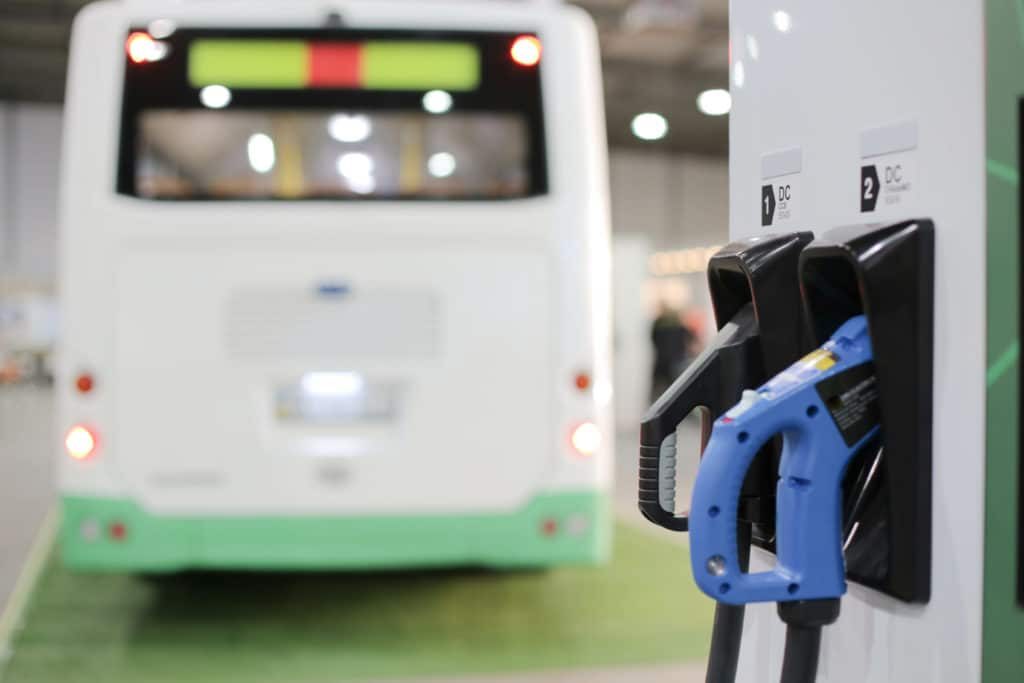
As the global transition to electric vehicles accelerates and larger numbers of EVs are introduced into fleets, the topic of electric vehicle fire safety has risen to the forefront of industry discussions. Incidents of electric bus fires over the past few years have brought questions to light such as:
To get expert insights on the answers to these questions, we spoke to Emma Sutcliffe, Director at EVFireSafe, a company dedicated to researching electric vehicle battery fires and emergency response. Funded by the Australian Department of Defense, EVFireSafe tracks EV battery fires around the world, gathering data and providing guidance, resources, and training on emergency response practices.
Watch the episode for the latest insights on electric vehicle fire safety for fleets.
Dan Hilson: The BetterFleet Academy provides fleet operators with everything they need to know about moving to an electric and hydrogen fleet. We look at issues in detail helped by thought leaders and our own staff here at Evenergi and BetterFleet.
Holly Montalban: In this episode, we’re going to dive into a subject that has really come into focus for fleet operators recently and that’s EV fire safety. We spoke to an expert in the field, Emma Sutcliffe, Director of EV FireSafe, a company funded by the Australian Department of Defense, dedicated to researching electric vehicle battery fires and emergency response. They track EV fires around the world, gathering data, providing guidance, resources and training on emergency response practices. Not only that, Emma is also a volunteer firefighter, so she brings real on-the-ground experience to the table as well. We spoke to Emma about how common EV battery fires are, how those incidents are managed if they do happen, and what fleet owners can do to mitigate the risk of EV fires and be prepared.
How common are electric vehicle battery fires?
Emma Sutcliffe: Passenger electric vehicle battery fires and indeed battery fires in road- registered electric vehicles are very rare, so they’re not common at all, and if you’re comparing your average family electric vehicle to an average family internal combustion engine vehicle, you’ve got a far less risk of your electric vehicle catching fire than you do with your petrol or diesel car. However, there are other types of electric vehicles that have a higher fire risk, so by that I’m talking about things like electric bikes, electric scooters, and electric skateboards. So I think when people talk about “There’s a high number of electric vehicle fires”, they’re conflating the two. So we’ve got road-registered electric vehicles which have very high quality battery cells, high quality battery management systems, they manage the battery pack incredibly well, and then we have what we’re terming “light electric vehicles” so e-bikes e-scooters e-skateboards, those kinds of smaller, single person mobility devices. Unfortunately a lot of those are coming to market with very low quality battery cells and low quality battery management systems – not all of them – but we are seeing quite a lot come to market with that lower quality.
So when we talk about road-registered electric vehicles we have a very low risk, it’s very rare to see a battery fire in a road-registered electric vehicle. It’s a really important point that we have an electric vehicle fire and then we have an electric vehicle battery fire. So part of what we do through our work is we see an electric vehicle on fire and we’re trying to determine whether or not the battery was involved. In 2022, in the Netherlands, of all the electric vehicle fires that they had, only 38 percent involved the high voltage battery.
So we can have an electric vehicle that’s burning, so the seats and the plastics and you know everything around the car is burning, but it doesn’t necessarily mean that battery’s going to become involved. So when we talk about electric vehicle fires and say we see these electric vehicles on fire and everybody automatically assumes this is a battery fire that’s going to take hours to put out, we’re going to have to cool it or submerge it or whatever we want to do, but actually in less than 50 percent of cases it doesn’t involve the battery at all, and you can have a car that’s fully involved in fire but the battery didn’t go into into thermal runaway, or there wasn’t a battery fire.
Holly: If an electric vehicle battery fire does happen, how do first responders deal with it?
Emma: The first battery passenger electric vehicle battery fire we recorded was back in 2010, but of course electric vehicles have been around for 100 years or more, it was just a different type of battery through the decades I guess.
So what we’re looking at from a firefighting perspective, if I talk as a firefighter, we still have a car fire, when we have an electric vehicle battery fire, it’s just that we have a different fuel source, which is the battery rather than you know potentially the fuel tank of a petrol car for instance, but we also have a longer incident duration typically so an electric vehicle battery fire will typically go for longer than a petrol car on fire.
To give you an example of a petrol or diesel vehicle, if we have one of those that’s fully involved in fire we can typically knock that down – and what we’d often do is smother it with foam – we can manage that incident in well under you know an hour typically, less than half an hour we can bring that under control. But when we have an electric vehicle battery fire we’ve got multiple cells in the battery pack that are overheating. So for instance a Tesla Model S has maybe 7,000 individual lithium-ion battery cells and if one goes into what we call thermal runaway which is the the technical term for a battery fire it can spread that heat to the next one and the next one and we get this kind of chain reaction. So it’s difficult because the battery cells are inside the battery casing it’s difficult for us as firefighters to firstly know if that heat is spreading or propagating from cell to cell, and it’s difficult for us to know if we’ve actually stopped that process by cooling down the battery. So that’s why it kind of takes a lot it typically takes a lot longer for us to manage an electric vehicle battery fire.
The common ways to deal with an electric vehicle battery fire is to cool the battery down using fire water so we’d get a hose underneath the car where the battery sits and we’d cool the battery down because what we’re dealing with is this heat generating, an exothermic chemical reaction. So by cooling it down we stop that from spreading through the battery pack. The other way that is a valid option here in Australia given our distances and open roads is to let the car burn. So if we actually have a battery pack on fire, what we can do is just let it burn out, which will take a number of hours, but what we end up with then is just scrap metal in the cells rather than live battery cells still.
So we manage that incident by letting it all burn out and then we end up with this scrap metal rather than stranded energy. And the stranded energy can be a problem because it can sometimes lead to a second ignition some days or weeks later, but to put all of that into context, it’s very rare. We can’t really prevent thermal runaway if it’s going to happen or if that process has started, it’s very difficult to pull it back So if we can cool a battery, if we’re there early enough, and we can cool down the battery, we can maybe prevent the battery from igniting but again that’s quite difficult and only happens very rarely.
Holly: What are some fire safety tips for fleet operators with EVs?
Emma: Like anything, prevention and awareness is the key here, it’s the silver bullet with everything. So for fleet managers in particular the message I’d give them is be alert but not alarmed about battery fires in your electrified fleet. So it’s going to happen very rarely, but what you will start to see of course is your fleet cars involved in collisions and potentially what we’re starting to see around the world is due to climate change more flooding events, so we know that those two things increase risk of battery fire.
So if an electric vehicle’s been involved in a collision and there’s been an impact on that battery pack, that may lead to thermal runaway leading to fire. But having said that, we see plenty of collisions where the battery pack is heavily damaged and we don’t have a fire. So it’s a really important message, just because a vehicle has been involved in a collision it doesn’t mean it ends in a fireball. But similarly if the vehicle’s been involved in a collision it’s sensible to quarantine that electric vehicle. By that I mean when it’s been towed somewhere park it away from flammables – we usually talk about a 15 meter exclusion zone – I know in some European countries that they’re building kind of kind of concrete like Jersey barriers to put between vehicles that have been damaged in that way, so they can park them a bit closer together but if there’s a fire it doesn’t spread.
And then with submersion we know that if an electric vehicle has been submerged in water particularly salt water, the water – and we’re talking about a flooding event here, not driving through puddles. We’re talking about an electric vehicle that’s been left in water for days but particularly with salt water, the salt water can get into the battery pack itself and corrode the battery cells and that can lead to thermal runaway. So any vehicle that’s been involved in a collision or submerged in flood water needs to be quarantined and kind of watched for those signs of thermal runaway. So with fleet managers it’s those two risk factors that we know can have an increased risk of battery fire but again it’s still only going to happen very rarely.
The other thing to note is be aware that if you’re any of your fleet vehicles is subject to a recall from the manufacturer and we’ve seen a number of recalls from Hyundai and Chevrolet more recently Jaguar Land Rover due to what we think primarily is a battery fault during the manufacture so if any vehicle is subject to a recall get those vehicles obviously back to the the manufacturer as quickly as possible to get that fault fixed.
Also out in the route if there’s charging along the electric bus route ensuring that it has a good collision protection so bollards, you know there’s no risk of the bus actually being able to impact that charging unit if it’s shunted the driver hasn’t put his foot on the brake at the right time.
Ensuring that your charging is very high quality – work with a good charging provider, so something that’s electrically compliant for your country or region, it’s installed to the correct standard and making sure that things like as I said before the collision protection is in.
From an emergency response perspective what we’d love to see is more isolation switches to charging units particularly in electric bus depots so if we turn up and there’s some kind of an issue with any electric bus in a depot we can immediately shut down all the charging maybe at a distribution board or the fire control room there’s a nice big red e-stop there that we can press and we can be sure that all the charging has been shut down, because that reduces our risk of electrocution there.
And then things like awareness for staff and the drivers so what is a lithium-ion battery? What is an electric bus? They may do some training around how to drive these these buses and those kinds of things but doing a bit of a deep dive into what’s actually inside this battery pack, what are the potential risk factors here, what can go wrong and what does it look like and sound like if it does go wrong?
And now there are plenty of early detection systems, thermal imaging cameras, those kinds of things, battery cell monitoring that’s constantly monitoring the packs inside electric buses, but also having that human factor of the people that are working around or driving these buses know that if there’s a loud popping noise or they see a bit of a puff of smoke what looks like smoke coming from the battery packs we have a problem we need to immediately alert somebody and get that bus isolate quarantined and checked. So there’s some really easy things, we don’t have any amazing solutions just yet, we’re still working that out on a global basis, but there’s some easy things that we can do that just give us that early warning and can potentially help us reduce any impact if a battery fire does occur.
Bus operators are in a unique position where they can where they can put some pressure I guess on the the bus manufacturers and the battery manufacturers to say, well obviously we’re looking for the safest electric vehicle we can have here, so things like a procurement policy where simple things like as I said before there’s isolation switches at various points so emergency responders or anyone can shut down charging quickly, that falls on the electric vehicle charging suppliers and installers, but for the bus manufacturers themselves things like that bus does not come into our depot until we have an Emergency Response Guide.
Now this is probably the only standardized thing globally is the emergency response guides for electric vehicles follow an ISO standard 17840 and that basically gives emergency responders and everybody working around these vehicles a step-by-step guide. If this happens, you do this. If this happens, you do this, and because it comes from the manufacturer themselves we know that information is good. So but we’re seeing passenger electric vehicles typically have an Emergency Response Guide but we’re seeing plenty of buses on the roads being piloted, trialed, or actually in operation that have no Emergency Response Guide, or certainly not one publicly available.
So it’s a really important point in the procurement policy for any fleet manager any operator looking to electrify or have electrified, gather that emergency information so an Emergency Response Guide, any additional information that the manufacturer can provide around what’s the battery chemistry and form type, what do they say in terms of if there’s a battery fire what do we do about it? Do we let it burn? Do we put water in it? Do we dump the whole thing in the river? What do we actually do? Because otherwise the operators themselves – because what’s going to happen is of course you’re going to call emergency services, but unless you can give emergency services some kind of information we’re a little bit in the dark too, we’re still learning too, and believe it or not no fire agency in the world currently has what we call standard operating procedures for dealing with an electric vehicle fire, a battery fire, because it is all so different and there are so many makes and models and it’s such a new thing that we’re all kind of globally working together to figure out what do we actually do.
For fleet managers, particularly those bus operators, I think having an emergency pack, so things like the Emergency Response Guide, site map of your depot so we can immediately see where the charging is located and where we can shut it down, obviously as many fire protection systems as you can, so sprinkler, ventilation, because we’ll see a lot of what we call a vapor cloud with if there’s a battery fire so having being able to have some visibility is really good with ventilation systems.
Hold familiarization days with your local brigades or local stations. You get a new electric bus in, you get some charging in the depot, call the local few stations around you and put some coffee and donuts on, and and get them down and show them the electric buses, show them how we isolate the high voltage systems in the electric bus, show them that you’ve got an emergency response guide, that how to shut down the charging has been rolled into your emergency plan for the site. So there’s a lot of ways that we can do things that are almost cost neutral to start protecting everybody.
Holly: Thanks for watching this episode of BetterFleet Academy where we aim to provide valuable insights and information on the transition to zero emission vehicles. We hope you enjoyed this episode and please share with anyone else you think might benefit from these videos. Stay tuned for more upcoming episodes on fleet electrification.

Understanding key risks and how to avoid them. Navigating costs, range, and safety risks.

Important considerations to guide the selection of electric vehicle fleet charging infrastructure.

Looking at trade-offs such as cost, charging infrastructure requirements and range.